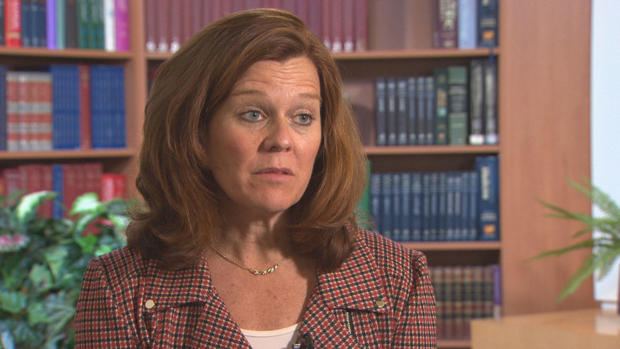BOSTON – October is Breast Cancer Awareness Month and every year the statistics give us pause.
According to data from the Breast Cancer Research Foundation, about 1 in 8 women in the US will develop invasive breast cancer during their lifetime.
Every 2 minutes, a woman in the US is diagnosed with Breast Cancer. Approximately 120 people die from metastatic Breast Cancer every day.
WBZ is proud to partner with the BCRF, and WBZ anchor Paula Ebben was part of the presentation Friday at the Hot Pink Luncheon and Symposium at the Boston Harbor Hotel. Not only is BCRF the largest private funder of Breast Cancer research, but all BCRF money raised in Boston STAYS in Boston. This year, BCRF is awarding over $8 million in grants to 44 researchers in the New England area alone.
One of those researchers is Dr. Ann Partridge from the Dana-Farber Cancer Institute. Her research focuses on women under 40, and she sat down with Paula Ebben to talk about some alarming numbers.
“Bottom line is that we’re seeing more diagnoses of breast cancer among young women these days,” Dr. Partridge said. “The numbers are going up nationally in the US and we’re trying to figure out not only why this is happening, but what we can do to both prevent it, as well as take better care of our young patients when they’re diagnosed.”
“It may be happening because of the fact that young women are generally not screened, and they get more aggressive breast cancer.”
In fact, a 2020 study shows an alarming trend in that age group in the US: A significant increase in Stage 4 Breast Cancer among younger women (under 40), and the number of 25-39 year old women with metastatic Breast Cancer increased 32% between 2009 – 2015.
Dr. Partridge thinks one reason may be putting off pregnancy. “We think one of the biggest factors for why we are seeing more breast cancer is the delay in having babies,” Dr. Partridge said. “That’s a socio-cultural phenomenon. We know that having babies before 30 is protective of our lifetime, whereas having babies after 30 is associated with an increased risk of breast cancer in the short term.”
CBS Boston
Whatever the cause, she warns that if women notice any change in their breasts, it is crucial to act – and ask questions.
“I think it’s really important for young women to know her own breast topography or what her breasts feel like, and be able to say to her doctor ‘I’m hopeful it’s nothing to worry about but it really does feel different and it’s scaring me – do you think we should get another test to evaluate it?’ That’s so empowering to be able to say that, right?”
Some women might worry about out-of-pocket expenses, but she adds, “The good news is that most insurance will cover an imaging study, whether it’s an ultrasound or a mammogram. If you’re working up a lump, it’s different when it comes to screening but if you feel something then your insurance should cover for the evaluation of that change that you’re looking to evaluate.”
Many people missed medical appointments during the pandemic, but Dr. Partridge says don’t be embarrassed, just make the appointment for whatever test you need whether it’s a check-up or a mammogram and just get in to see your doctor.
“We’ve already seen a bit more advanced stage breast cancer walking in the door because of the shutdown and because of some of the delays and so we’re encouraging all of our patients and women who are worried about a symptom and certainly people who are in the right age or risk groups to get screening to get their screening done, get them scheduled and get in and have the tests,” Dr. Partridge said.
Dr. Partridge adds that another big issue is getting treatments that work to all populations. There are healthcare access problems in the US and around the world, and another way the Breast Cancer Research Foundation helps support research is in trying to improve access and understanding about therapies to populations that for whatever reasons have been difficult to reach.
And remember, it is recommended that mammograms start at 40, but if a woman thinks something is up, a physician can help you get one even if you are under 40 and think you’re “too young to get it.” You are not.
Stay connected with us on social media platform for instant update click here to join our Twitter, & Facebook
We are now on Telegram. Click here to join our channel (@TechiUpdate) and stay updated with the latest Technology headlines.
For all the latest Education News Click Here


